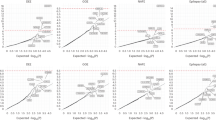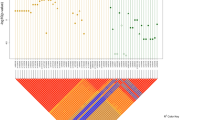Abstract
Rolandic epilepsy (RE) is the most common focal epilepsy in childhood. To date no hypothesis-free exome-wide mutational screen has been conducted for RE and atypical RE (ARE). Here we report on whole-exome sequencing of 194 unrelated patients with RE/ARE and 567 ethnically matched population controls. We identified an exome-wide significantly enriched burden for deleterious and loss-of-function variants only for the established RE/ARE gene GRIN2A. The statistical significance of the enrichment disappeared after removing ARE patients. For several disease-related gene-sets, an odds ratio >1 was detected for loss-of-function variants.
Similar content being viewed by others
Log in or create a free account to read this content
Gain free access to this article, as well as selected content from this journal and more on nature.com
or
References
Fejerman N. Atypical rolandic epilepsy. Epilepsia. 2009;50 Suppl 7:9–12.
Carvill GL, Regan BM, Yendle SC, O’Roak BJ, Lozovaya N, Bruneau N, et al. GRIN2A mutations cause epilepsy-aphasia spectrum disorders. Nat Genet. 2013;45:1073–6.
Lemke JR, Lal D, Reinthaler EM, Steiner I, Nothnagel M, Alber M, et al. Mutations in GRIN2A cause idiopathic focal epilepsy with rolandic spikes. Nat Genet. 2013;45:1067–72.
Lal D, Reinthaler EM, Altmüller J, Toliat MR, Thiele H, Nürnberg P, et al. RBFOX1 and RBFOX3 mutations in Rolandic epilepsy. PLoS ONE. 2013;8:e73323.
Lal D, Reinthaler EM, Schubert J, Muhle H, Riesch E, Kluger G, et al. DEPDC5 mutations in genetic focal epilepsies of childhood. Ann Neurol. 2014;75:788–92. May 1
Reinthaler EM, Dejanovic B, Lal D, Semtner M, Merkler Y, Reinhold A, et al. Rare variants in γ-aminobutyric acid type A receptor genes in rolandic epilepsy and related syndromes. Ann Neurol. 2015;77:972–86.
DePristo MA, Banks E, Poplin R, Garimella KV, Maguire JR, Hartl C, et al. A framework for variation discovery and genotyping using next-generation DNA sequencing data. Nat Genet. 2011;43:491–8.
De Rubeis S, He X, Goldberg AP, Poultney CS, Samocha K, Ercument Cicek A, et al. Synaptic, transcriptional and chromatin genes disrupted in autism. Nature. 2014;515:209–15.
Yang H, Wang K. Genomic variant annotation and prioritization with ANNOVAR and wANNOVAR. Nat Protoc. 2015;10:1556–66.
Kircher M, Witten DM, Jain P, O’Roak BJ, Cooper GM, Shendure J. A general framework for estimating the relative pathogenicity of human genetic variants. Nat Genet. 2014;46:310–5. Mar
Zhan X, Hu Y, Li B, Abecasis GR, Liu DJ. RVTESTS: an efficient and comprehensive tool for rare variant association analysis using sequence data. Bioinformatics. 2016;32:1423–6.
Syrbe S, Hedrich UBS, Riesch E, Djémié T, Müller S, Møller RS, et al. De novo loss- or gain-of-function mutations in KCNA2 cause epileptic encephalopathy. Nat Genet. 2015;47:393–9. Apr
Epi4K Consortium, Epilepsy Phenome/Genome Project. Ultra-rare genetic variation in common epilepsies: a case-control sequencing study. Lancet Neurol. 2017;16:135–43.
Petrovski S, Wang Q, Heinzen EL, Allen AS, Goldstein DB. Genic intolerance to functional variation and the interpretation of personal genomes. PLoS Genet. 2013;9:e1003709–e1003709.
Pirooznia M, Wang T, Avramopoulos D, Valle D, Thomas G, Huganir RL, et al. SynaptomeDB: an ontology-based knowledgebase for synaptic genes. Bioinformatics. 2012;28:897–9.
Kirov G, Pocklington AJ, Holmans P, Ivanov D, Ikeda M, Ruderfer D, et al. De novo CNV analysis implicates specific abnormalities of postsynaptic signalling complexes in the pathogenesis of schizophrenia. Mol Psychiatry. 2012;17:142–53.
Mo A, Mukamel EA, Davis FP, Luo C, Henry GL, Picard S, et al. Epigenomic signatures of neuronal diversity in the mammalian brain. Neuron. 2015;86:1369–84.
Darnell JC, Van Driesche SJ, Zhang C, Hung KYS, Mele A, Fraser CE, et al. FMRP stalls ribosomal translocation on mRNAs linked to synaptic function and autism. Cell . 2011;146:247–61.
Samocha KE, Robinson EB, Sanders SJ, Stevens C, Sabo A, McGrath LM, et al. A framework for the interpretation of de novo mutation in human disease. Nat Genet. 2014;46:944–50.
Firth HV, Richards SM, Bevan AP, Clayton S, Corpas M, Rajan D, et al. DECIPHER: Database of Chromosomal Imbalance and Phenotype in Humans Using Ensembl Resources. Am J Hum Genet. 2009;84:524–33.
EpiPM Consortium. A roadmap for precision medicine in the epilepsies. Lancet Neurol. 2015;14:1219–28.
Acknowledgements
We thank all participants and their families for participating in this study. We thank the members of the Genomics Lab and the ERGO support team for their help in sampling the data and in creating the database. Parts of the analysis of this were conducted on the HPC facilities of the University of Luxembourg. The authors are grateful to the study participants, the staff of the Rotterdam Study and the participating general practitioners and pharmacists. The authors would like to thank the Exome Aggregation Consortium and the groups that provided exome variant data for comparison. A full list of contributing groups can be found at http://exac.broadinstitute.org/about. This study makes use of data generated by the DECIPHER community. A full list of centres who contributed to the generation of the data is available from http://decipher.sanger.ac.uk and via email from decipher@sanger.ac.uk.
Author contributions
Data analysis: DRB, DL, PM, EMR, HT, KJ, WJ, RK. Supervision of data analysis: PM, RK, HL, BAN. Study design: PN, HL, FZ, BAN, Writing the manuscript: DRB, DL, PM, BAN. Editing and revising the manuscript for scientific content: all authors.
Funding
HL, BAN, PN, TS and FZ received grants by the EuroEPINOMICS programme (DFG grant numbers: HL: LE1030/11-1, BAN: BN416/5-1, PN: NU50/8-1, TS: SA434/5-1, FWF grant number: FZ: I643-B09) within the EUROCORES framework of the European Science Foundation (ESF). DRB was supported by the JPND Courage-PD research grant. The generation and management of genomics data for the Rotterdam Study are supported by the Netherlands Organisation of Scientific Research NOW Investments (nr. 175.010.2005.011, 911-03-012) and the Netherlands Genomics Initiative (NGI)/NOW project nr. 050-060-810 (Netherlands Consortium for Healthy Ageing; NCHA). The Rotterdam Study is funded by Erasmus Medical Center and Erasmus University, Rotterdam, Netherlands Organization for the Health Research and Development (ZonMw), the Research Institute for Diseases in the Elderly (RIDE), the Ministry of Education, Culture and Science, the Ministry for Health, Welfare and Sports, the European Commission (DG XII) and the Municipality of Rotterdam. Funding for the project was provided by the Wellcome Trust.
EuroEPINOMICS consortium contributing members: (contributing centers listed by country)
Department of Neurology (Eva M. Reinthaler, Fritz Zimprich) and Department of Pediatrics and Adolescent Medicine, Medical University of Vienna, Vienna (Martha Feucht), 1090 Vienna, Austria; Private Practice for Pediatrics (Hannelore Steinböck), 1150 Vienna, Austria; St. Anna Children’s Hospital, Department of Neuropediatrics (Birgit Neophytou), 1090 Vienna, Austria; Department of Pediatrics (Julia Geldner), Hospital SMZ Süd Kaiser-Franz-Josef, 1100 Vienna, Austria; Department of Pediatrics (Ursula Gruber-Sedlmayr), Medical University of Graz, 8036 Graz, Germany; Department of Pediatrics (Edda Haberlandt), Medical University of Innsbruck, 6020 Innsbruck, Austria; Department of Pediatrics (Gabriel M. Ronen), McMaster University, L8N3Z5 Hamilton, Ontario, Canada; Cologne Center for Genomics (Janine Altmüller, Dennis Lal, Peter Nürnberg, Thomas Sander, Holger Thiele) University of Cologne, 50931 Cologne, Germany; Luxembourg Centre for Systems Biomedicine (Roland Krause, Patrick May, Rudi Balling), University of Luxembourg, 4365 Esch-sur-Alzette, Luxembourg; Department of Neurology and Epileptology, Hertie Institute of Clinical Brain Research (Holger Lerche), University of Tübingen, 72076 Tübingen, Germany; Department of Neuropediatrics (Bernd A. Neubauer), University Medical Faculty Giessen and Marburg, 35385 Giessen, Germany.
Author information
Authors and Affiliations
Consortia
Corresponding authors
Ethics declarations
Conflict of interest
The authors declare that they have no conflict of interest.
Ethical approval
We confirm that we have read the Journals position on issues involved in ethical publication and affirm that this report is consistent with those guidelines.
Additional information
EuroEPINOMICS consortium contributing partners are listed above References.
D.R. Bobbili, D. Lal and P. May contributed equally to this work.
Electronic supplementary material
Rights and permissions
About this article
Cite this article
Bobbili, D.R., Lal, D., May, P. et al. Exome-wide analysis of mutational burden in patients with typical and atypical Rolandic epilepsy. Eur J Hum Genet 26, 258–264 (2018). https://doi.org/10.1038/s41431-017-0034-x
Received:
Revised:
Accepted:
Published:
Version of record:
Issue date:
DOI: https://doi.org/10.1038/s41431-017-0034-x
This article is cited by
-
Genetik und genetische Diagnostik fokaler Epilepsien des Kindesalters – Was? Wann? Warum?
Clinical Epileptology (2024)
-
Novel and known minor alleles of CNTNAP2 gene variants are associated with comorbidity of intellectual disability and epilepsy phenotypes: a case–control association study reveals potential biomarkers
Molecular Biology Reports (2024)
-
Genetics and genetic diagnosis of focal childhood epilepsy
Clinical Epileptology (2024)



